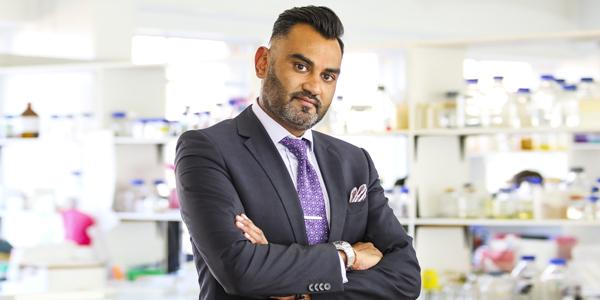Two leading Wits scientists appointed to National Advisory Council on Innovation
- Wits University
Professor Lynn Morris and Professor Bavesh Kana will advise government on how to harness and grow innovation.
Professor Lynn Morris is Deputy Vice-Chancellor for Research and Innovation at Wits, while Professor Bavesh Kana is Director of the Department of Science and Innovation/National Research Foundation (DSI/NRF) Centre of Excellence for Biomedical TB Research.
Another Witsie in a leadership role at the Council is acting CEO of NACI, Dr Mlungisi Cele, who also serves on the Wits Council on appointment by the Department of Higher Education and Training.
The members of NACI (other than the CEO and the officer from the Department of Trade and Industry) are appointed in their personal capacities due to their outstanding achievement in any field of science and technology, or in the context of innovation, special knowledge, experience and insight into the role and contribution of innovation, in promoting and achieving national and provincial objectives.
As NACI members, Morris and Kana thus do not represent Wits University specifically. Rather, Morris represents higher education and Kana innovation. In their personal capacities, they will provide a high-level view of innovation nationally, advise on innovation priorities, and expenditure.
A National Research Foundation A-rated scientist, Morris is internationally recognised with demonstrable experience in research management and leadership. She was previously the interim Executive Director of the National Institute for Communicable Diseases (NICD) where she led the NICD through the listeria outbreak of 2017/18 and the Covid-19 pandemic from 2020. She has published some 270 journal articles, 11 book chapters, registered five patents and 11 scientific opinions. She has consistently been included in the Web of Science’s most highly cited researchers in the world.

“South Africa doesn’t fare well in innovation indicators. Zero point 62 percent of our GDP goes into research and development in South Africa,” says Morris. “NACI demonstrates that government values science, technology, and innovation and it’s very important to have that buy-in.”
Zero point 62 percent is the 2019 figure in the South African Science, Technology and Innovation Indicators report (STI Indicators report, pg. 29), which NACI produces as a tool to monitor the National System of Innovation (NSI).
The report compares South Africa’s performance with selected countries and aims to identify relative strengths and weaknesses of the national research and innovation system and inform priorities to improve innovation performance.
The Indicators report is influenced by the South African Innovation Scorecard and the NACI Monitoring and Evaluation Framework, as well as the expansive impact of the Covid-19 pandemic.
According to the Indicators report, “Due to the prolonged Covid-19 pandemic the South African economic growth has declined with consequent negative impact on the NSI. The gross expenditure in research and development [GERD] as a percentage of growth domestic product has declined to 0.62%, which is a worrying trend regarding the 1.5% target.”
As a NACI member, Morris can tap into different networks to gauge where South Africa is nationally and globally. Morris says there was a big push on innovation during Covid-19 and NACI now is “about introducing technology to grow the economy.”
Such technologies include patents and the report shows that, in 2020, South Africa ranked below all four of the BRICS group of countries in Rankings in Patent Applications per Million Inhabitants. Furthermore, South Africa also ranked lower than India for the first time in a decade (STI Indicators report, pg. 33).
Fortunately, Professor Bavesh Kana – who researchers tuberculosis (TB) – is no stranger to successful patent applications. The introduction of technology that tests for TB using molecular diagnostics was a game changer for national TB programmes. This tech increased access to TB testing, which then improved diagnosis and treatment, and ultimately inhibited further infection.

However, when the World Health Organization endorsed this molecular diagnostic test, there was no quality assurance in place to check the accuracy of the testing instruments. Kana was part of the Wits team that developed the SmartSpot technology which, in South Africa, has been used on all 289 GeneXpert testing instruments in the national TB programme since 2011.
In 2020, Kana pivoted this technology to support national diagnosis of Covid-19 through supporting laboratories in the public sector. He created a new series of products that enabled mass testing in South Africa, which have now been rolled out to 34 countries. For these and related activities, his team was awarded the South African NSTF-South32 Innovation Award: Corporate Organisation, for 2020/2021.
Read how Wits University approaches innovation to advance society for good via the new Wits Innovation Centre (WIC).

